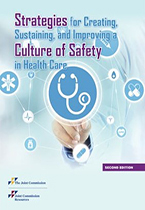
*The use of Joint Commission Resources consultative technical or advisory services is not necessary to obtain a Joint Commission Accreditation award, nor does it influence the granting of such awards.

*The use of Joint Commission Resources consultative technical or advisory services is not necessary to obtain a Joint Commission Accreditation award, nor does it influence the granting of such awards.